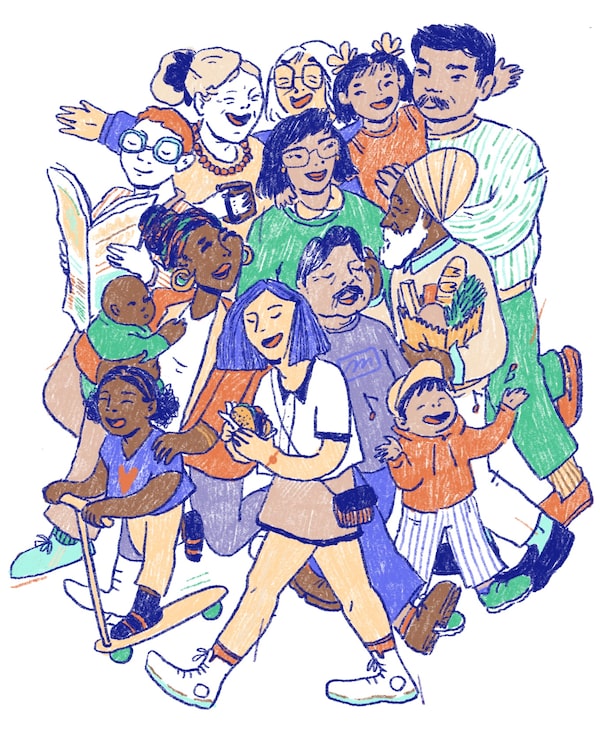First Person is a daily personal piece submitted by readers. Have a story to tell? See our guidelines at tgam.ca/essayguide.

Illustration by April Dela Noche Milne
“Where are you from?” the cashier behind the counter asked me innocently. I was ordering a piece of raspberry white chocolate cake in the old quarter of Quebec City. I found myself dumb-struck by the simple question asked by the young French Canadian with large green eyes. What does he want to know? Does he want to know where I am travelling from? Or where I usually live? Or my nationality? Or where I was born? Or what I call a hometown?
Since I grew up, worked, lived and raised a family in several different places around the globe, I find myself increasingly confused when I am asked that question. Sometimes, I look with envy at a person who can simply say, “I come from Lunenburg, N.S.” I wonder what it would be like to be born, go to school, work, raise a family and die in one town. There were times when that was the ideal. You are known to your neighbours all through your life. They know your father, mother and grandparents. You are never a stranger, except for a brief time while you travel. If you ever had to leave your hometown, that was a source of great sorrow for your family and yourself.
But I was born under the star of wanderlust, at least that was my mother’s diagnosis for my tendency not to stay in one place long. I travelled extensively in my 20s and chose a job that required 100 per cent travel. Finding a place to belong could have been my chief motivation at the time. It is still a mystery to me why I felt like a stranger in Seoul, the city in which I was born and raised.
Maybe it was because of my father, who never found a place for himself throughout his life. He did not get along with his own father and left home in his youth. A little over 10 years following his marriage to my mother was perhaps the most stationary period in his life, although he travelled often for work. He left us while he was still seeking something – we do not know what it was exactly. He frequented Japan, China and other countries in Southeast Asia before he died quite suddenly of cancer. He did not leave his daughters any wealth or high status, two important elements for young Korean women to build their life upon. But he gave us his dreamy eyes – and the strong belief that there is somewhere far away where each one can find real happiness.
Naturally, I was not happy with my position in the social hierarchy of modern South Korea. I had a job that would lead nowhere, a humble place to live and a set of good middle-class friends. After my best attempt at social climbing (by trying to get into a prestigious university) failed, I started to look abroad.
At the end of the travelling spree in my 20s, I decided to settle in Toronto. I did not know anyone there. I simply made my decision based on my experience of visits and after doing a little research on the country’s multiculturalism, rich natural resources and population. With 9.985 square kilometres of landmass and more than 38-million people, there had to be a place for me!
Canada took me and my husband – newlyweds from Korea – and treated us well. It provided us with education, stable jobs and a great deal of optimism. We learned a new language, North American pragmatism and how to get along with multitudes of immigrants from all different cultures and backgrounds. In our neighbourhood, we met a woman who escaped the genocide in Rwanda, a Coptic Christian pharmacist from Egypt, newlyweds from war-torn former Yugoslavia and a Buddhist monk from Tibet – and all while we walked dogs, waited for the school bus and pulled toboggans. With many stories in their hearts, all lived with immense gratitude and relief that life could be normal and even mundane here. We had our daughter and raised her in the suburbs of Toronto. She tells anyone who asks, without a moment of hesitation, that she is a Canadian.
As soon as my daughter became a teenager and required little care from me, my wanderlust returned. I wanted to go to the States to work on my graduate degree. My husband, who flew across the Pacific without too much thought in his 30s, knew too well the risks and hardships involved in moving to yet another country in his 50s. But he also knew that having an unhappy wife at home might be more difficult than having a happy wife far away. So, we agreed that it was best for him to stay until our daughter left for college. I would be away only for a couple of years anyways.
After finishing my masters in Nevada, I went to California. I was a foreigner, once again. Every excursion was an adventure. Every restaurant meal was a new experience.
“San Francisco,” I answered that French Canadian cashier since I had been in the San Francisco Bay area for a little more than a year at that point.
“Oh,” he said, handing back my credit card. “What’s your native language?” he ventured.
“Korean,” I answered.
“Gam-sa-hahm-ni-da!” he said with decent pronunciation. I smiled widely. “Gam-sa-hahm-ni-da!” I said, with a small bow that typically accompanies the phrase in Korea.
“This is Canada,” I thought as I stepped out into the frizzed cold air in Quebec.
I would move two more times in the States, then, one day I got up and realized that it was time to come home. I flew to Toronto the next morning. It is winter now. Blizzards will happen but people still walk dogs, wait for the school bus and pull toboggans. Immense gratitude fills my heart. Perhaps, I finally found my place after all.
Candace Suh-Lee lives in Toronto.

The Globe and Mail wants to hear from Canadians about their love stories from across the decades. We're looking for reader-submitted stories from each generation to celebrate the magic of love. Click here to submit yours.